Present conventional wisdom has it that the war in Ukraine has unified Western nations in unprecedented (and unanticipated) ways. After years of appeasement and failing to reckon with a reborn Russian imperialism, the U.S. and NATO nations are awaking from their moral and military slumber. So it is thought.
The January 20th meeting of defense ministers from 50 nations at Ramstein Air Force Base in Germany is a telling reminder of the true state of that unity. Inter alia at issue was Germany’s unwillingness, in the end, to authorize or supply Ukraine with their highly coveted, sophisticated Leopard 2 battle tanks, of which there are 2,000 currently among NATO member nations. (Leopards need Berlin’s permission to be re-exported to Ukraine). German Chancellor Olaf Scholz had stated prior to the Friday summit that the supply of Leopards would not proceed apart from a commitment of the U.S. to send M1 Abrams tanks. The rationale for Germany’s unwillingness, as might be expected, is the “fear of escalation” and “to avoid this [conflict] becoming a war between Russia and NATO.”
Scholz would do well to be reminded that it was Western weakness that caused Putin to invade Ukraine in the first place. In response to Scholz, Poland’s President Andrzej Duda admonished Berlin on January 17 at the World Economic Summit in Switzerland to get in step with Warsaw’s plan to send Leopard 2 tanks to Ukraine. Speaking for his own country, Duda stated: “At the moment we will hand over to Ukraine our Leopard tanks from our own units, at the same time, of course modernizing our own army and taking care of our own security . . . We obviously understand that this is our duty as Polish authorities.”
While Europe and Ukraine’s allies may be unexpectedly winning the energy war, it’s unclear whether the US and its allies are committed to winning on the battlefield. Eastern European nations, of course, are more realistic about what is at stake in the war. Poland and the Baltic states are no strangers to the Russian imperialist threat.
The question going into February is quite simple: Will the US and Europe permit the war to grind on? All indications are that Russia is preparing for a new offensive in the late winter. For the second time in seven months, the Russian Defense Ministry has replaced its commander of Russian forces in Ukraine. On January 11th the Kremlin appointed Russia’s Chief of Staff General Valery Gerasimov as commander of Russian forces in the region, replacing General Sergei Surovikin. This appointment all but guarantees a strategic offensive. The attempts by Putin and Russian Foreign Minister Sergei Lavrov to prepare the Russian people psychologically for further atrocities have grown rhetorically more forceful in recent weeks. Lavrov stated on Monday, January 23, that negotiations between Moscow and Kyiv are “now impossible” and that “There can be no talk of negotiations with Zelensky.”
The Ukrainians did not choose this conflict; it is a war that is wholly unjust and condemned by all conventional just war criteria and moral measurements. As we enter year two of Russia’s invasion of Ukraine, we are confronted with two choices. One is that we stand back, deliberate and obfuscate, allowing the courage and valor of an innocent nation to be all for naught, whether by (a) our refusal to help Ukraine defeat Putin’s dreams of domination or by (b) our guaranteeing a long, drawn-out stalemate. In both cases, we will have refused to provide Ukraine with precisely those weapons that she so desperately needs.
The second option is to help Ukraine win the war – a war that determines freedom or tyranny in Europe and beyond for the future. Such resolve will require moral backbone on the part of the US and our NATO nations. America’s record, which from Vietnam to Kabul has been characterized by ambiguity at best and withdrawal at worst, has surely not inspired many around the world. However, Ukraine offers us the opportunity to make a difference in the world – one that will have a monumental impact on international security and foreign affairs over the next five to ten years, at minumum. In the free world, it needs reiterating that to whom much has been given, much is surely required.
In assessing the two options, what can we say that we know with certainty as it affects the Ukrainian situation? Several things are crystal clear. For one, we can be assured that Ukrainians will continue to fight to the death for a just cause, resisting the onslaughts and war crimes of the Russian oppressor. We can also be sure that Poland and the Baltic states will continue supporting Ukraine; after all, if Ukraine falls or becomes a “militarized zone” (thereby guaranteeing a protracted conflict), as Holman W. Jenkins, Jr., has pointed out, those neighbor states who have known Russian tyranny are next. Not surprisingly, Latvia, Estonia, and Lithuania made a joint call to Germany on January 21, urging it to assume its leadership role and send the Leopard tanks to Ukraine.
What’s more, a stalemate will allow Russia to menace the Eastern European region in a way that Soviet expansion and repression did previously. Finally, we know that the Kremlin is willing to commit war crimes and do the abominable, with Vladimir Putin presiding over nothing less than a criminal underworld.
As Vitali Klitschko, the mayor of Kyiv, reminded the world in recent days, suing or pressuring Hitler for peace was not an option. Nor is it today with Putin. The U.S. and the NATO alliance must go to the next level, forcing Putin’s dream to come crashing down. Former U.K. Prime Minister Boris Johnson is spot on: it is in everyone’s interest that “the curtain come down as soon as possible” on Putin’s misadventure. “Not in 2025, not in 2024, but in 2023.”
At Friday’s meeting of the Ukraine Defense Contract Group, U.S. Defense Secretary Lloyd Austin warned fellow Allied defense ministers that time is short in terms of the war effort, suggesting that even the U.S. has a greater role to play. And Ukraine’s Defense Minister Yuriy Sak stated the agonizing truth: “It seems like we are always a couple of steps behind and we should be a couple of steps ahead.” Austin concluded his remarks by reminding the allies that “this is not a moment to slow down.”
A recent Wall Street Journal opinion piece had it right: Why not call Germany’s bluff and announce that Abrams tanks are in fact heading toward Ukraine? Fortunately for Ukraine, the bluff has been called. On January 24th, Washington announced that the U.S. is sending 31 Abrams tanks to Ukraine, resulting in Germany’s decision to send a small number of Leopards and approve third-party requests among European allies.
The best option – the moral option – is to help Ukraine repel an unjust – indeed, a criminal – aggressor. After all, what may well be the world’s largest terror organization, at least currently, should not be allowed to set a new precedent of geopolitical barbarism. Too much is at stake in the world.
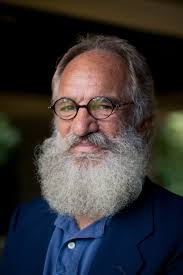
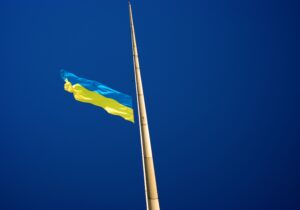

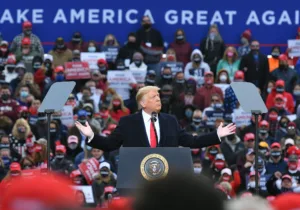
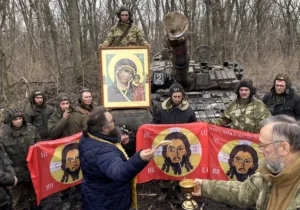
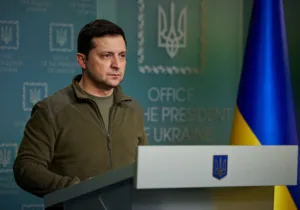

 Sponsor a student for Christianity & National Security 2024
Sponsor a student for Christianity & National Security 2024